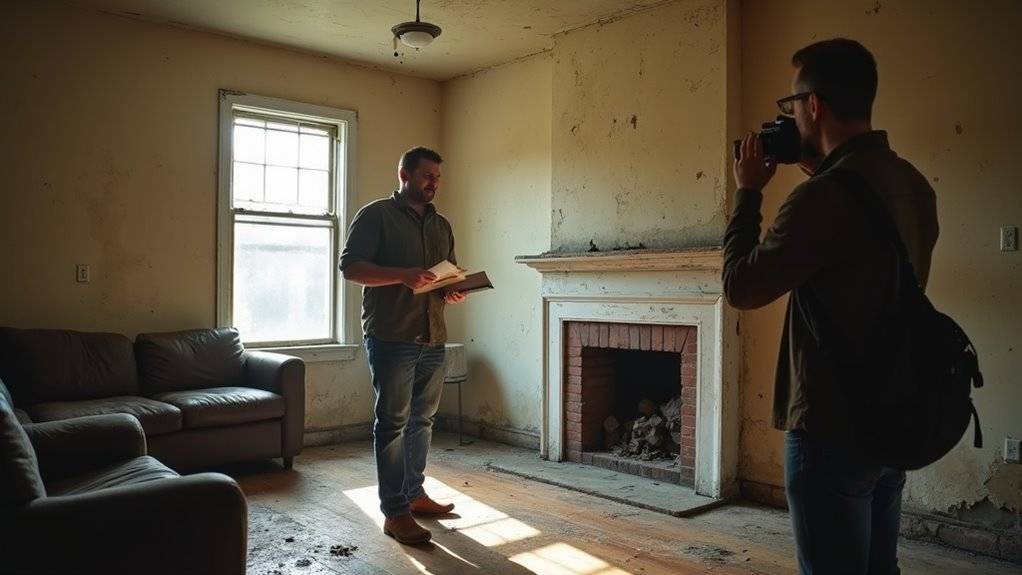Selling a house with mold or water damage is tough. Most buyers walk away when they see these issues. You may feel stuck with a property that seems impossible to sell.
Buyers worry about health risks and expensive repairs. Traditional sales can drag on or fall through completely. The longer your house sits, the more stressful the situation becomes.
There is good news. You can find cash buyers for a house with mold or water damage by targeting investors who see potential. They buy homes as-is and move quickly.
You just need to know how to reach them. This blog will guide you step-by-step to find the right cash buyers and close the sale successfully.
Key Takeaways
- Connect with local real estate investment groups who specialize in buying and flipping homes needing repairs or remediation.
- List the property on investor-focused websites and social media groups to reach cash buyers seeking distressed properties.
- Work with real estate agents experienced in selling distressed or “as-is” homes to access their network of cash buyer investors.
- Contact reputable “We Buy Houses” companies that purchase homes in any condition, including those with mold or water damage.
- Disclose all damage transparently and provide inspection reports to build trust and attract serious cash buyers looking for fixer-uppers.
Understanding the Appeal of Cash Buyers

Cash buyers are popular because they purchase homes quickly and accept them in any condition. They do not require repairs or long approval times. This helps sellers with damaged homes sell faster. Additionally, because they are familiar with selling a house as-is, cash buyers often understand the risks and costs of fixing these issues.
Their offers often reflect those expected expenses. Industry reports show homes needing repairs sell up to 30% faster to cash buyers. Sellers avoid complications and extra costs by choosing this route. You can move forward with less stress, even if your home needs work. Our local expertise and understanding of the local real estate market allow us to make fair offers for homes in any condition.
Assessing the Extent of Mold or Water Damage
You need to know how bad mold or water damage is before talking to cash buyers. An inspection helps you understand your home’s condition. This also shows buyers that you are honest about any problems.
You should look for black, green, or white patches on walls and ceilings. Mold often grows in damp places. If you see any, take clear photos.
A musty smell can mean there is hidden mold or water damage. If you notice this odor, check for leaks nearby. Listen for dripping sounds around pipes or under sinks.
Water stains can show up as discoloration or bubbling on ceilings and drywall. Floors may also peel or feel soft. Take notes and pictures of any damaged areas.
If you find leaks, try to find where the water is coming from. Fixing these issues can stop the damage from getting worse. Addressing damage mitigation techniques early can prevent further deterioration and reduce repair costs. If you do not, buyers may lower their offers.
Accurate records let you explain the state of your home to buyers. If you are honest, buyers can make fair decisions. This helps avoid problems during negotiations.
Understanding damaged property conditions is essential to setting proper expectations and pricing when selling a home with mold or water damage.
Pricing Your Property Competitively

To price your property competitively, match your price to its actual condition. Start by researching recent sales of similar damaged homes nearby. Check both their listing and final sale prices for a clear benchmark.
If the property has mold or water damage, set the price lower than undamaged homes. Cash buyers often expect a discount for repairs. You could list slightly under market value to attract more interest.
Homes with major damage usually sell for 60-80% of their undamaged value. Accurate pricing draws investors who want quick deals. This strategy helps you get offers faster in a crowded market. Fair cash offers are often based on these adjusted valuations, making it easier to sell quickly. Being aware of local market dynamics can further refine your pricing strategy and attract reliable buyers.
Preparing Honest and Transparent Disclosures
You need to document every known issue, no matter how minor, to protect yourself and meet legal disclosure requirements. Full transparency not only keeps you compliant but also increases buyer trust—83% of buyers say honest disclosures influence their decision.
By being upfront, you’ll attract serious cash buyers who value straightforward transactions. Additionally, providing proof of professional mold remediation can further reassure buyers of the property’s condition. Being prepared with detailed documentation can also help you navigate market challenges more effectively.
Documenting All Known Issues
Documenting all known issues is necessary when selling a house with mold or water damage. Clear records protect you legally and help attract serious buyers. If you skip this step, buyers may lose trust or walk away.
A full property inspection helps you find every problem. You can do this yourself or hire a certified inspector. If you miss something, buyers might ask for a lower price.
Take photos of all visible mold, water stains, and other damage. Make a list that shows the location and size of each issue. If you have repair invoices or contractor reports, collect those as well.
Summarize everything in a clear document. This record shows buyers you are honest about the condition. If buyers see you are transparent, they can better estimate repair costs.
Legal Disclosure Obligations
You must disclose any mold or water damage when selling your property. Honest and early disclosures help you avoid legal problems. If you delay, you could lose the sale or face lawsuits.
Each state has its own rules for what and when you must disclose. Sellers should learn about local laws before listing their property. Written statements and inspection reports make your disclosure clear.
If you give buyers all the facts, you are less likely to get into legal disputes. Sellers who fully disclose issues cut legal risks in half. Ask buyers to sign documents showing they received the information.
The table below highlights key disclosure steps:
| Requirement | Why It Matters | Best Practice |
|---|---|---|
| Early Disclosure | Prevents legal delays | Disclose before listing |
| State Compliance | Avoids penalties | Research local laws |
| Documentation | Provides proof | Share all reports |
| Mold/Water Detail | Builds credibility | Specify affected areas |
| Buyer Acknowledgment | Confirms receipt | Get signed confirmation |
Building Buyer Trust
Honest and clear disclosures help buyers feel confident. If sellers share information openly, buyers are more likely to trust them. This trust encourages cash buyers to stay interested, even if there are issues like mold or water damage.
If you provide detailed reports about mold and water damage, buyers can assess risks quickly. Inspection results and cost estimates make the condition clear. You should also share before-and-after photos to show repairs or improvements.
Neighborhood data helps buyers understand the price and future returns. If you include local market trends, buyers can make informed decisions. Offering this information adds valuable context.
Repair receipts and warranties prove that any repairs are real and completed. These documents show buyers that the work is trustworthy. Being proactive with disclosures attracts serious buyers and may speed up negotiations.
Marketing Your House to Investors
To attract investors to a house with mold or water damage, provide clear and honest information about the property. Investors want transparency, so include recent inspection reports. These reports help investors understand the risks and potential.
If you highlight the property’s future value, investors may look past current issues. Use simple home staging to help them see the property’s potential. Quality photos showing both problems and possibilities can make your listing stand out.
If you target cash buyers who focus on distressed homes, your chances improve. Data and professional assessments can support your asking price. Investors are more likely to respond if you present the property as an opportunity for growth.
Additionally, understanding capital gains tax implications can aid in structuring your sale to maximize profit. Being aware of market trends can help you time your sale effectively and attract serious buyers.
Leveraging Local Real Estate Investment Groups

Local real estate investment groups can help you sell your house faster. These groups have buyers who know how to handle houses with mold or other issues. If you want a quick sale, consider reaching out to these groups. Connecting with local investors can provide access to buyers specifically interested in properties in your area.
You can attend local meetups to meet these investors. Bringing documents about mold and repairs can build trust with buyers. If you join online forums, you may find more investors interested in your property. Building relationships with group members can lead to quicker offers.
If you provide updates on repairs, you may keep buyers interested. Utilizing your local real estate market expertise can also help identify buyers who are prepared to handle properties with issues. Using this approach could speed up your home sale.
Connecting With “We Buy Houses” Companies
Selling your house to a “We Buy Houses” company is a simple way to handle mold or water damage. These companies buy homes in any condition, so you do not need to make repairs. If you need to sell quickly, this is often the fastest option.
Most investors will check the house for damage before making an offer. If you are honest about mold problems, the sale will go smoother. Deals can close in as little as seven days if all terms are clear.
You will not need to wait for a long listing period or negotiate with many buyers. If you want a safe sale, research each company before signing anything. Choosing a reputable company helps protect you from scams.
Being aware of Fair Cash Offers and the importance of transparency can help ensure you’re working with trustworthy buyers. Working with a local North County, MO company like ours ensures you receive honest and upfront offers and a smooth closing process.
Networking With Real Estate Agents Specializing in Distressed Properties
Working with real estate agents who focus on distressed properties can help you find more cash buyers quickly. These agents have networks of investors who want houses needing repairs, such as mold or water damage. If you need to sell a problem property fast, their help is valuable. Understanding co-ownership rules can also assist if multiple owners are involved in the sale process.
Agents specializing in distressed homes know investors who want projects requiring mold remediation. They can explain home inspection reports to highlight your property’s potential. If you want to attract cash buyers, their marketing skills are useful.
Listing on Cash Buyer-Focused Online Platforms
You can reach serious cash buyers by listing your property on popular investor websites, targeted social media groups, and real estate wholesaler networks. These platforms attract thousands of investors actively seeking distressed properties, increasing your chances of a quick sale. Data shows that properties listed on specialized platforms sell up to 30% faster than those using traditional methods.
Popular Property Investor Websites
You can reach motivated cash buyers quickly by using popular property investor websites. These sites attract buyers who handle properties with mold or water damage. If you need a fast sale, these platforms are a good choice.
BiggerPockets Marketplace connects you with experienced property investors. Connected Investors is a large network focused on off-market and problem properties. PropertyShark targets professionals who buy and fix distressed homes.
Auction.com is popular with buyers who want bargains, often in bulk. If you list your property on these sites, you can find serious cash buyers. Industry reports show that most investment deals now begin online.
Targeted Social Media Groups
Social media groups help you find cash buyers and real estate investors interested in damaged properties. You can join these groups and share your property directly with people looking for such deals. This approach increases the chance of reaching serious buyers.
If you use virtual staging, buyers can better imagine the property’s potential. Drone photos give a full view of the property and attract more attention. Data shows listings with quality visuals get 60% more engagement.
Different platforms offer unique benefits. Facebook lets you post in investor groups with virtual staging photos. LinkedIn is good for showing investment benefits, while Instagram works well for sharing drone images. BiggerPockets allows you to post before-and-after photos to attract investors.
If you use these groups wisely, you will reach more qualified buyers. This strategy helps your property stand out and increases your selling chances.
Real Estate Wholesaler Networks
Real estate wholesaler networks help sellers find cash buyers for homes with mold or water damage. These platforms connect sellers with investors who buy distressed properties quickly. Listing your home here can speed up the selling process.
If you want the best results, follow a few key steps. First, research popular wholesaler sites such as Connected Investors, Wholesale Real Estate, and PropertyShark. These websites attract buyers interested in fixer-upper properties.
You should create a detailed listing with clear photos showing the home’s renovation potential. If possible, mention staging ideas to help buyers see the property’s value. Good descriptions increase interest from investors.
Neighborhood analysis can highlight local market trends and investment opportunities. This information helps buyers understand the area’s potential. If the neighborhood is improving, mention this in your listing.
You should respond to buyers’ questions honestly, especially about mold or water issues. If you give clear answers, buyers are more likely to trust you. Direct engagement often leads to faster sales.
Utilizing Social Media to Reach Investors
Social media is a fast way to reach many real estate investors. Platforms like Facebook, LinkedIn, and Instagram help you find buyers looking for distressed properties. If you use these sites, you can quickly connect with people interested in homes with mold or water damage.
You can post before-and-after photos to show property improvements. Virtual tours or short videos let investors see repair needs and layout. If you want more attention, use hashtags or paid ads to target local investors.
Recent data shows that 77% of real estate investors use social media to find deals. Clear pictures and honest information attract buyers who want to close quickly. If you optimize your posts, you will reach more serious and data-driven investors.
Hosting Investor-Focused Open Houses
Open houses for investors help sell homes with mold or water damage faster. Investors value clear information and quick solutions. A focused event can increase the likelihood of a quick sale. Investor open houses speed up sales of homes with mold or water damage by providing clear information and quick solutions.
Sellers should use home staging to show the home’s structure and areas ready for updates. Inspection reports and repair estimates should be available for review. These documents help build trust with potential buyers.
Guided tours can point out the property’s strong features and renovation opportunities. Printed data on similar “as-is” sales provides helpful context. Offering simple refreshments can promote networking among attendees. If you use these steps, you are more likely to attract investors ready to buy with cash.
Highlighting the Property’s Investment Potential
You’ll attract serious cash buyers when you clearly emphasize the property’s value-add opportunities and present data on potential renovation ROI. Use market comparables to show how similar homes, once improved, command higher prices. Underscore the current undervaluation to position your property as a smart investment with strong growth potential.
Emphasizing Value-Add Opportunities
Properties with mold or water damage can offer investors a chance to add value. These homes often sell below market price. Buyers willing to fix issues may see good returns.
If you address mold or water problems, you can make the home more livable. Upgrading old systems, such as plumbing or HVAC, can also increase appeal. Investors can rework the layout to create more usable space.
Improving the yard or updating the exterior may boost curb appeal. If these changes are made, the property could attract more buyers. Visualizing these updates helps investors see potential profit.
Showcasing Renovation ROI
Renovation for mold or water damage can offer a strong return on investment. Many homes with recent repairs have sold for higher prices. If investors want proof, they should look at local case studies and property comparisons.
Actual numbers help show the value. For example, mold repair might cost $2,500 and add $15,000 to the resale price. If you can present both costs and resale estimates, investors will see the profit margin.
Professional water damage repair often reassures buyers and lenders. This can help sell the property faster. A simple chart with timelines and profit projections can make your case clear.
If you show proven returns, investors may consider your property a smart choice. Renovation can turn a damaged house into a valuable asset. Cash buyers often look for projects with clear, strong returns.
Underscoring Market Undervaluation
Homes with mold or water damage often sell for less than their true market value. This lower price gives cash buyers a good investment chance. If buyers understand property values, they can spot these hidden deals in a busy market.
Cash buyers look for lower-priced homes because they see profit after repairs. Sellers can highlight this by sharing recent sales of fixed-up homes. If you show before-and-after values, buyers can see the potential gain.
A list of repair costs compared to future value helps buyers make quick decisions. Local trends may show that prices are rising even for damaged homes. If the area is improving, buyers may act fast.
Pointing out undervaluation attracts serious buyers and sets clear expectations. This helps create faster and more focused negotiations. If you present the facts clearly, buyers are more likely to make strong offers.
Negotiating With Cash Buyers Effectively
Cash buyers often see homes with mold or water damage as investments. You need a clear plan to get the best price. If you use smart negotiation, you can improve your results.
Start by looking up recent sales of similar damaged homes in your area. This helps you set a fair and competitive price. If you price correctly, buyers will see you know the market.
Show buyers repair estimates and inspection reports. These documents support your asking price and show you are prepared. If you provide proof, buyers are less likely to offer too little.
Point out the property’s strengths, like location or resale value after repairs. If you stay calm and confident, buyers may offer more. You should let them know you have other interested buyers.
If you use data and stay firm, you can get better offers. You may also close the sale faster. If you prepare well, you will have a smoother negotiation.
Navigating the Closing Process With a Cash Offer
A cash offer can make closing on a house with mold or water damage much quicker. The process is simpler because no lender is involved. If you follow each step, you can avoid delays or legal issues.
A title company checks who owns the property and looks for any unpaid debts. Both the buyer and seller sign the sales agreement, which lists all the terms. The buyer then sends the money to an escrow account for safety.
The buyer gets to inspect the house one last time before closing. You should be ready for this final walkthrough. Staying organized helps you close the sale smoothly and quickly.
Conclusion
If you need to sell a house with mold or water damage, you have several options. If you price your property competitively and disclose all issues honestly, you can attract serious cash buyers. Many investors look for homes like yours and can close quickly.
If you want a fast and stress-free sale, working with a cash home buyer may benefit you. We buy houses for cash in any condition, including homes with water or mold damage. Freedom Path Investors values transparency and aims to make the process easy for sellers.
If you are ready to sell your damaged property without making repairs, contact us today. We can provide a fair cash offer and a quick closing. Let Freedom Path Investors help you move forward with confidence.







